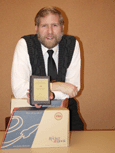I understand HarperCollins point from a business perspective. Essentially they want us to have to buy a new book after 25 circs. Realistically, most pop fiction books are pretty well used up after that many circs, and we’d be buying a new copy if it was something we wanted to keep around. In my opinion there aren’t that many non-fiction titles that even achieve 25 circs during a reasonable period of time before they’re just plain out of date. So I don’t think they’re that far off in their numbers. Their whole problem is that e-Books don’t wear out like paper books.
As a Librarian I hate that any publisher would stoop to that level of anti-library activity. As it is now if we can somehow keep a copy in circulation with 100 circs then we do, as long as it remains popular, relevant, and in good condition. In the real world where I work, that’s mighty tough to do in most cases.
They’re wrong, but not unreasonably wrong. Remember the old Div-x DVDS that expired after they were played a few times. A reasonable idea from the publisher’s perspective, but not one that worked for the consumer, and they died in the free marketplace. In this case as in that old one, the market economy will ultimately decide.
Just my thoughts,
Mike
Monday, February 28, 2011
Tuesday, July 13, 2010
Of Kindles, Nooks, and iPads Oh My!
The year of the eBook reader is upon us. With the launch of the Apple iPad, followed by a price skirmish, if not an all out war, between Amazon, Borders and Barnes & Noble it seems the popularization of the consumer eBook reader lforecast long ago is now finally at hand.
Last week the 'Lectric Librarian got to spend some quality time with both a Kindle and an iPad side by side. In terms of sheer readability in bright sunlight and battery life the Kindle is the clear winner. In all other categories the iPad wins. Apple's own iBooks while perhaps the slickest presentation of the eBook yet, doen't have the depth of titles that Amazon brings to the Kindle. However because of Apps that allow content from Amazon, Apple and Barnes & Noble to be read on the iPad it is the overall winner. Zinio as well as custom magazine and newspaper apps bring additional content to the iPad and allow publishers to present information in interactive ways only a few publications are yet able to grasp.
For a great and now less expensice eReader the Kindle is a fantastic device. Credit goes to the Nook from breaking down the $200 price wall with an equally great e-Ink screen. The Apple iPad while more expensive provides the user more options for content and a gorgeous Color touch screen display that signals a new paradigm in truly personal computing. 2010 is the year of the eBook and will be remembered as the year personal computing changed the most since 1984.
Last week the 'Lectric Librarian got to spend some quality time with both a Kindle and an iPad side by side. In terms of sheer readability in bright sunlight and battery life the Kindle is the clear winner. In all other categories the iPad wins. Apple's own iBooks while perhaps the slickest presentation of the eBook yet, doen't have the depth of titles that Amazon brings to the Kindle. However because of Apps that allow content from Amazon, Apple and Barnes & Noble to be read on the iPad it is the overall winner. Zinio as well as custom magazine and newspaper apps bring additional content to the iPad and allow publishers to present information in interactive ways only a few publications are yet able to grasp.
For a great and now less expensice eReader the Kindle is a fantastic device. Credit goes to the Nook from breaking down the $200 price wall with an equally great e-Ink screen. The Apple iPad while more expensive provides the user more options for content and a gorgeous Color touch screen display that signals a new paradigm in truly personal computing. 2010 is the year of the eBook and will be remembered as the year personal computing changed the most since 1984.
Tuesday, March 16, 2010
Digital Filling Station
In a world of electronic books and other content, the Public Library should become the digital filling station. It's been a long journey and it's far from finished. A Universal format is key. As long as competing devices require different formats, the library is placed in the untenable position of choosing to support this device or that one, or purchasing the same title in multiple formats. In an era of shrinking budgets it is simply not possible to buy everything patrons want in every variant format. The issue of proprietary formats and devices like the Kindle is another matter entirely and the subject of a future post.
The 'Lectric Librarian
The 'Lectric Librarian
Subscribe to:
Posts (Atom)
